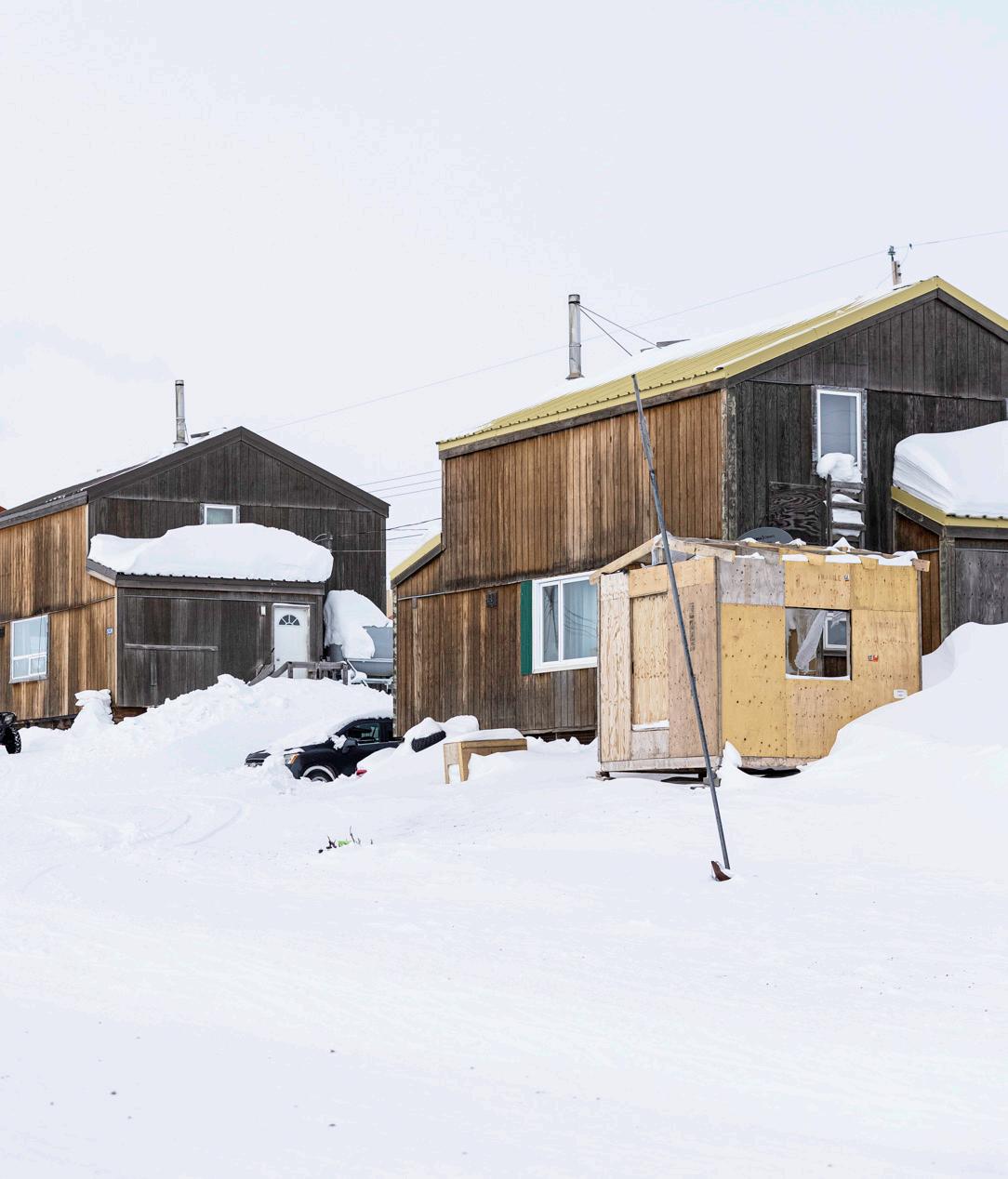
3 minute read
Ilitaqsiniq pilots four-day workweek
Kugaaruk Naujaat
Twenty new public housing units are destined for each of Rankin Inlet, Arviat and Baker Lake under the recent announcement. NNSL file photo
150 Public Housing Units On The Way
Nunavut
Nunavut Housing Corporation and NCC Development Limited announced the signing of design-build contracts for the construction of 150 new public housing units across eight Nunavut communities, with construction commencing in fall 2023.
The design-build contracts are part of the 202324 Public Housing Delivery Plan under Igluliuqatigiingniq, also referred to as the Nunavut 3000 Strategy.
The design-build negotiated construction contracts for 132 public housing units outside of Iqaluit, including 20 new units in each of Arviat, Rankin Inlet, Baker Lake, Arctic Bay, Gjoa Haven and Taloyoak, plus an additional 12 units in Cambridge Bay.
The total contract value, including design and site costs, of these 132 units is $92.5 million – approximately $600 per square foot in construction costs. An additional 18 public housing units were also approved for Iqaluit at a total contract value of $12.8 million.
“The execution of these design-build contracts for 150 public housing units aligns with the vision of Nunavut 3000 and reflects a significant increase in the annual supply of new public housing units desperately needed across the territory,” stated NHC CEO and President Eiryn Devereaux in a news release.
“Our organization is committed to mobilizing Inuit-owned and Northern resources to build homes by and for Nunavummiut. The Nunavut 3000 Strategy includes meaningful and effective training programs that will ensure we lead in the development of skills for Inuit who are interested in a career in the trades. Specifically, we have an Inuit labour target of 30% for our negotiated partnership contracts for public housing units and see this as an opportunity to increase training and capacity development for Inuit in the construction trades sector,” stated NCCD CEO and President Clarence Synard in the release.
The total estimated cost of the Nunavut 3000 Strategy is approximately $2.57 billion to create up to 3,000 housing units across the territory by 2030, with approximately $890 million targeted to be funded by private sector investment and approximately $1.68 billion targeted to be funded by public sector resources.

Sanikiluaq
Move to encourage cultural connection, compete for staff
By Stewart Burnett Northern News Services Local
To help employees connect with their cultural roots, enjoy the sun and retain skilled staff, Ilitaqsiniq is piloting a fourday workweek over the summer.
“We’re always looking to be cutting edge, and we’re firm believers in our innovative approach to things,” said executive director Adriana Kusugak.
Kusugak had been researching four-day workweek studies and reading positive reports, so she brought the concept to senior management and then the board of directors for Ilitaqsiniq, who all supported running a pilot project for the non-profit. Working with human resource specialists, Ilitaqsiniq developed the pilot model and a series of ways to track, monitor and review its success.
“The whole goal behind this four-day workweek is to support our employees, to help them restore their mental health and wellness,” said Kusugak.
And this isn’t one of those four-day workweeks that tacks on an extra two hours each day. The organization has opted to follow the 100-80-100 model, which means 100 per cent salaries, 80 per cent hours and 100 per cent effort. Staff will be working Monday to Thursday at regular hours but paid for five days of work.
“We’re essentially giving them an additional day off on Fridays,” said Kusugak.
And it’s not only for the employees’ wellbeing: it’s also a pitch to retain and recruit staff in a difficult hiring environment.
“It is also an opportunity to be used as a recruitment and retainment tool,” said Kusugak. “Because we are a not-forprofit organization at Ilitaqsiniq, we can’t compete in some ways with other organizations, but one way that we can is by being creative and innovative and that’s where the four-day work week comes in.”
Hiring is difficult worldwide, in all industries and contexts, said Kusugak.
“Our goal as always is to recruit Inuit who are passionate about serving Nunavummiut,” she said. “If we can use this pilot to support that, then we’re all for it.”
More than anything, though, the goal is for staff to have extended weekends over the summer to engage in Inuit cultural practices, enjoy the sun and connect with family.
“We want to give our staff the opportunity to engage in that because they’ll be using all that learning and information in their programs anyway,” said Kusugak.
The pilot runs May 8 to September 1. Through it, staff will be tracking their work and how they’re feeling about the initiative. Afterward, Ilitsqsiniq will digest the information, analyze it and produce some reports of the findings.
“The goal would be to do it more than once,” said Kusugak, if the data and feedback support it. “I think in order to really research something, you have to do it more than once to prove anything.”
The ultimate goal, she said, is to make the four-day workweek from May to September part of the organization’s workplace policy.
As Ilitaqsiniq prides itself on being forward-thinking, the non-profit will also be sharing its results with other employers in the territory – despite being competitors – to potentially encourage them to implement a similar policy as well.
“Our whole goal as an organization is to empower Nunavummiut,” said Kusugak.
Nunavut's
¥∂‡ç
NNSL Media, a division of
Publishers of:
• Nunavut News/North • Inuvik Drum
• Kivalliq News • Yellowknifer
• NWT News/North • Hay River Hub
Member of:
• Manitoba Community Newspapers Association
The trickle-down social effects of a poor economy





